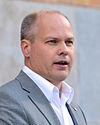| Minister of the Interior | |
|---|---|
| Inrikesminister | |
 | |
| Ministry of the Interior (1947–74, 1996–98) Ministry of Justice (2014–2022) | |
| Member of | The Government |
| Appointer | The Prime Minister |
| Term length | Serves at the pleasure of the Prime Minister |
| Inaugural holder | Eije Mossberg |
| Formation | 1947 |
| Final holder | Morgan Johansson |
| Abolished | 2022 |
The Minister of the Interior [a] (Swedish : Inrikesminister) was a cabinet minister within the Swedish government and appointed by the Prime Minister of Sweden. From 1947 to 1974 and from 1996 to 1998, the minister headed the Ministry of the Interior.
Contents
- List of officeholders
- Ministers of the Interior (1947–1973)
- Ministers of the Interior (1996–1998)
- Ministers for Home Affairs (2014–2022)
- Footnotes
- References
It was reintroduced as a minister without portfolio post under name of Minister for Home Affairs in 2014. Its tasks includes issues regarding the Swedish Police Authority and combating terrorism.






